New Arrivals, New Dreams
The dawn of a new academic year at Qatar Foundation (QF) brings anticipation, vibrancy, fun – and the sense of new beginnings.
August saw the latest group of new student arrivals at Education City settle into their new surroundings, explore the unique ecosystem and story they were now part of, and immediately get to work on moving toward the realization of their goals, and their potential.
For QF’s Hamad Bin Khalifa University, a new record was set as it welcomed its largest-ever cohort of new students, while at QF’s partner universities, Carnegie Mellon University in Qatar’s 120 newcomers took its total number of students to 467, from 60 nations – the largest student roll in its history.
And among Weill Cornell Medicine-Qatar’s new intake of 51 students in its pre-medical program, alongside the 49 entering its medical program, was Amna Al-Naimi, who said: “I am very excited and eager to further my knowledge – even after just a few days, I already feel part of the community here.”
The dawn of a new academic year at Qatar Foundation (QF) brings anticipation, vibrancy, fun – and the sense of new beginnings.
August saw the latest group of new student arrivals at Education City settle into their new surroundings, explore the unique ecosystem and story they were now part of, and immediately get to work on moving toward the realization of their goals, and their potential.
For QF’s Hamad Bin Khalifa University, a new record was set as it welcomed its largest-ever cohort of new students, while at QF’s partner universities, Carnegie Mellon University in Qatar’s 120 newcomers took its total number of students to 467, from 60 nations – the largest student roll in its history.
And among Weill Cornell Medicine-Qatar’s new intake of 51 students in its pre-medical program, alongside the 49 entering its medical program, was Amna Al-Naimi, who said: “I am very excited and eager to further my knowledge – even after just a few days, I already feel part of the community here.”
Fresh faces, fresh landmarks, fresh excitement – Education City was once again alive with students in July, as students began and continued their learning journey at QF.
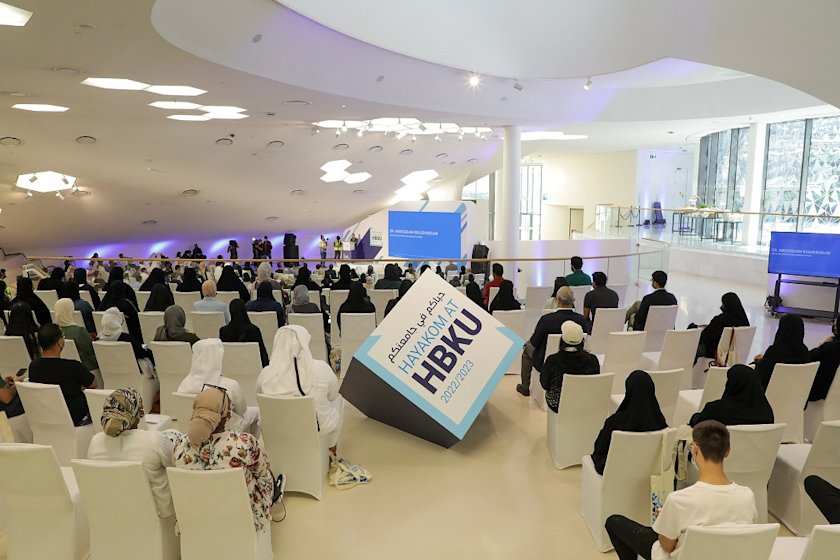
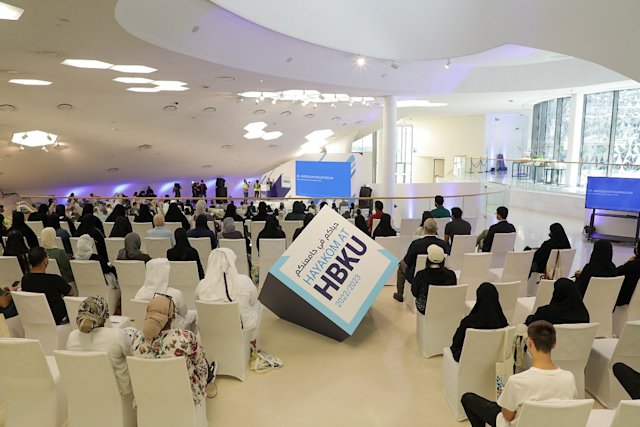
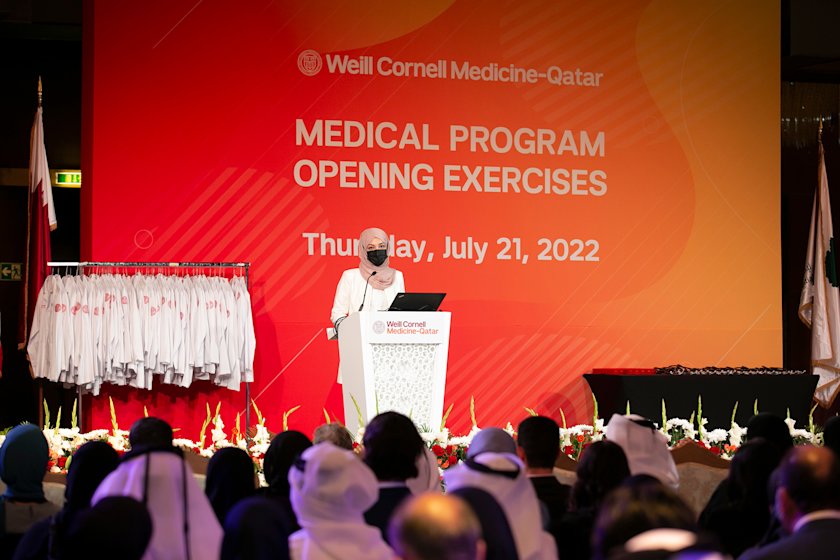
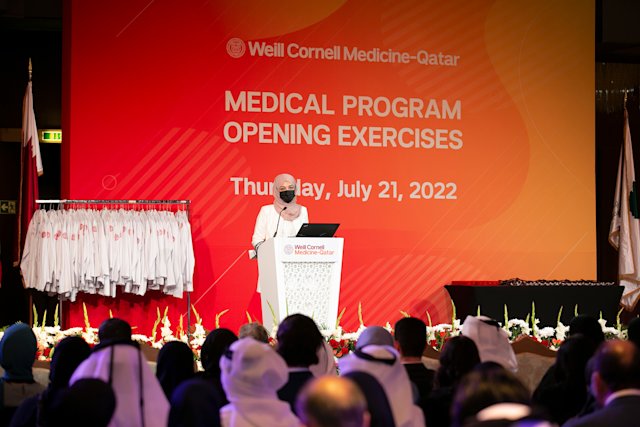
HBKU’s 329 new students included 97 Qataris – an increase of almost 50 percent from 2021
Paths to Follow, Stories to Tell
A milestone was also reached at Texas A&M University at Qatar, which saw more Qatari freshmen enter its engineering programs than ever before – 156, of whom 53 are female.
Among the female engineers of the future who are moving toward fulfilling their ambitions at TAMUQ is Sara El-Sallabi, an electrical engineering student, who said: “I wanted to be in a university that had diversity in its faculty and student body, helping me gain a well-rounded and global perspective – being at TAMUQ will put me on the right path to achieve my goals.”
Students from countries ranging from Albania to Zimbabwe were among the 120 new arrivals at Northwestern University in Qatar, with 75 new students from over 20 countries joining the art and design courses at Virginia Commonwealth University School of the Arts in Qatar.
Meanwhile, Salman Abdulla El-Amadi – one of the 124 incoming students from over 40 countries at Georgetown University in Qatar- summed up overriding feeling among QF’s newest student body: “I believe each individual has a story to tell – we will be together for the next four years, so we should make sure we enjoy the journey.”
A milestone was also reached at Texas A&M University at Qatar, which saw more Qatari freshmen enter its engineering programs than ever before – 156, of whom 53 are female.
Among the female engineers of the future who are moving toward fulfilling their ambitions at TAMUQ is Sara El-Sallabi, an electrical engineering student, who said: “I wanted to be in a university that had diversity in its faculty and student body, helping me gain a well-rounded and global perspective – being at TAMUQ will put me on the right path to achieve my goals.”
Students from countries ranging from Albania to Zimbabwe were among the 120 new arrivals at Northwestern University in Qatar, with 75 new students from over 20 countries joining the art and design courses at Virginia Commonwealth University School of the Arts in Qatar.
Meanwhile, Salman Abdulla El-Amadi – one of the 124 incoming students from over 40 countries at Georgetown University in Qatar- summed up overriding feeling among QF’s newest student body: “I believe each individual has a story to tell – we will be together for the next four years, so we should make sure we enjoy the journey.”
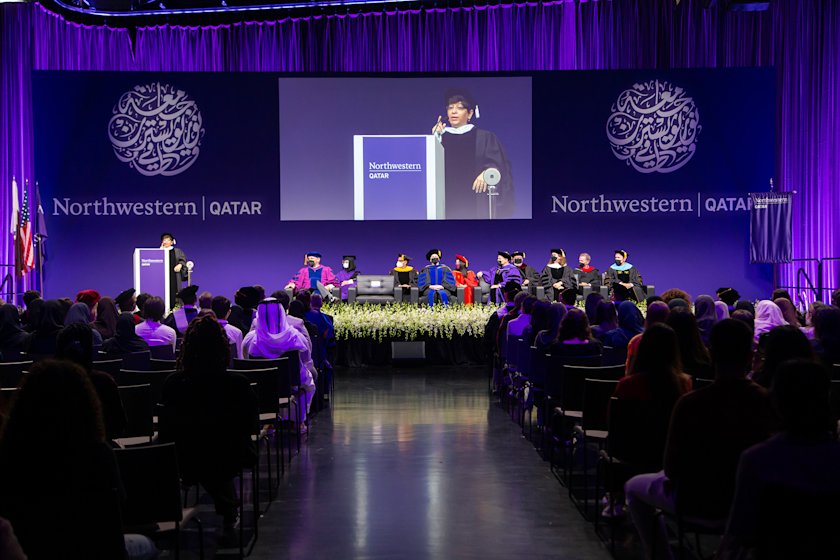
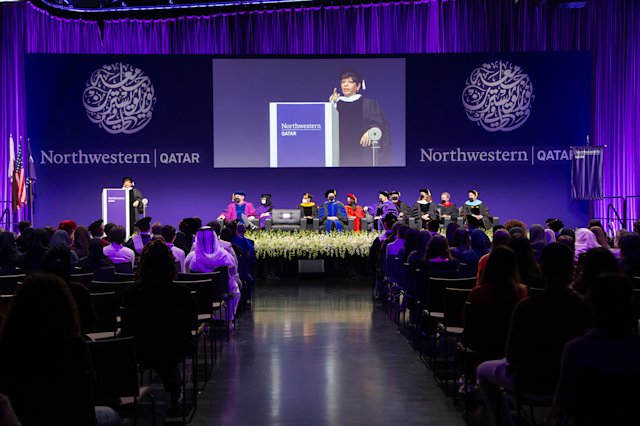
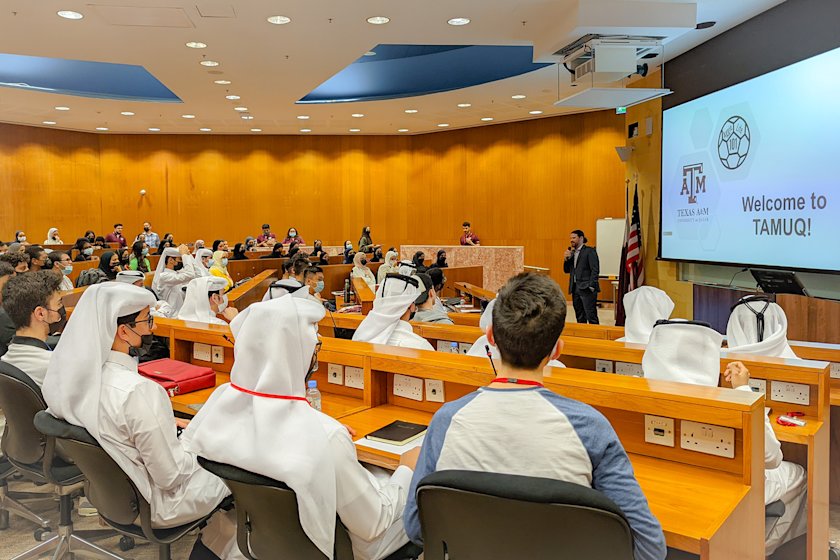
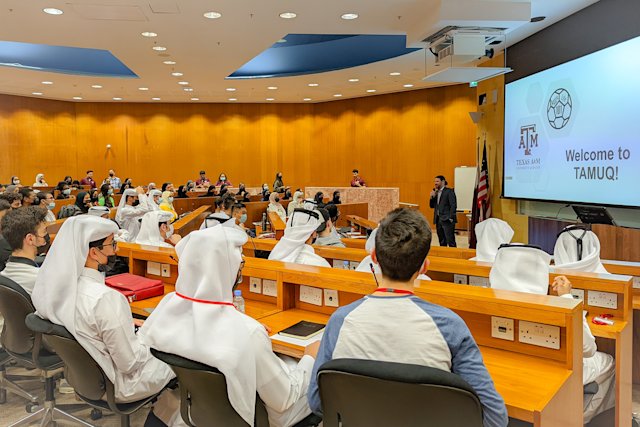
When I learned there was an Art History degree program available at VCUarts Qatar, I jumped at the chance.
Showcasing a Nation of Knowledge
As a new campaign designed to promote Qatar as a world-class education hub was launched, QF – with its commitment to knowledge and discovery, and its unique, integrated, and multidisciplinary education ecosystem – was fully behind its goals.
The campaign, spearheaded by Qatar Tourism in partnership with QF and Qatar University, targets students and parents in the region, showcasing what the nation’s leading universities have to offer, and how they can open up a world of opportunities for students.
“QF’s Education City is a true testament to Qatar’s national-level commitment to education,” said Hend Zainal, Executive Director of Strategy, Management, and Partnerships at QF’s Higher Education division. “We believe that quality education underpins the development of nations and the realization of individuals and communities’ true potential.
“We are proud of our partnership with Qatar Tourism through this campaign that will showcase the benefits that quality education brings to Qatar, the region, and the world, and we hope that this will position Qatar as a regional hub for education.”
As a new campaign designed to promote Qatar as a world-class education hub was launched, QF – with its commitment to knowledge and discovery, and its unique, integrated, and multidisciplinary education ecosystem – was fully behind its goals.
The campaign, spearheaded by Qatar Tourism in partnership with QF and Qatar University, targets students and parents in the region, showcasing what the nation’s leading universities have to offer, and how they can open up a world of opportunities for students.
“QF’s Education City is a true testament to Qatar’s national-level commitment to education,” said Hend Zainal, Executive Director of Strategy, Management, and Partnerships at QF’s Higher Education division. “We believe that quality education underpins the development of nations and the realization of individuals and communities’ true potential.
“We are proud of our partnership with Qatar Tourism through this campaign that will showcase the benefits that quality education brings to Qatar, the region, and the world, and we hope that this will position Qatar as a regional hub for education.”
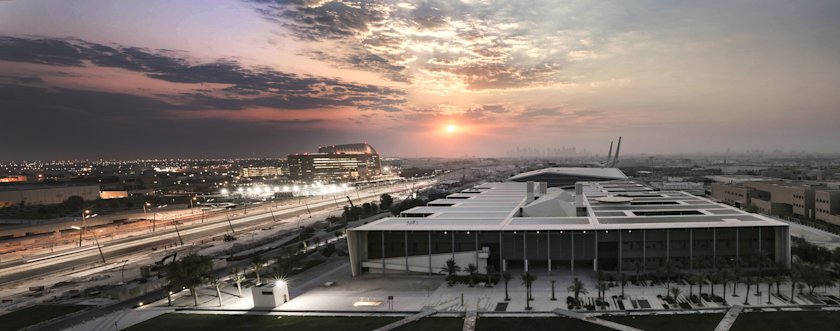
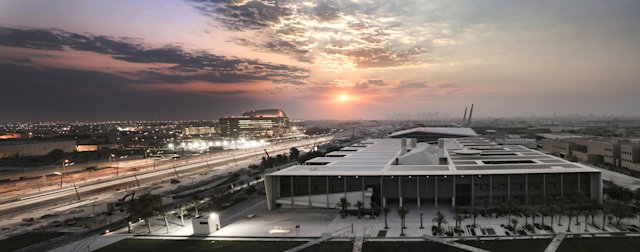
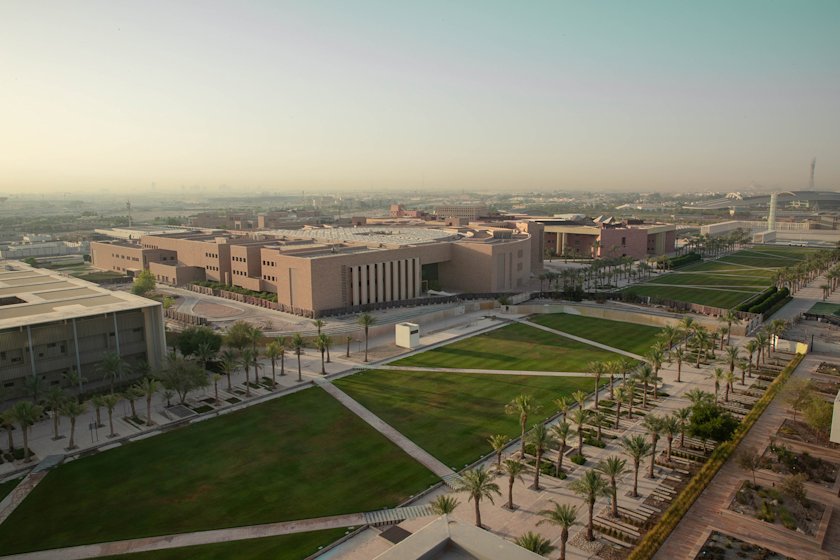
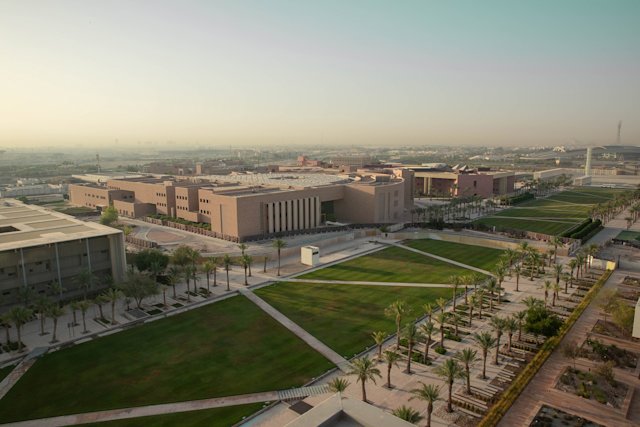
Education through Art
The range and diversity of knowledge opportunities within QF’s Education City opens up a world of learning beyond the classroom – as kindergarten students at a QF school discovered when they explored how art is a form of storytelling.
By visiting Mathaf: Arab Museum of Modern Art, which is based at Education City, the five-year-old students from Qatar Academy Sidra (QAS) – one of the schools under QF’s Pre-University Education – learned how artists present narratives by examining the work of Kader Attia, a French-Algerian artist whose collages combine people, animals, and places.
It is just one example of how the many different elements of QF’s ecosystem intertwine with each other, creating an environment of knowledge that is unlikely any other in the world, with QAS teacher Beata Kulig saying: “Often, when you ask a child what a story is, they think of it as a book they can read, or a story told by their parents and grandparents.
“We wanted to show children the different ways they can tell stories through art by trying to figure out what the artist is trying to tell us.”
The range and diversity of knowledge opportunities within QF’s Education City opens up a world of learning beyond the classroom – as kindergarten students at a QF school discovered when they explored how art is a form of storytelling.
By visiting Mathaf: Arab Museum of Modern Art, which is based at Education City, the five-year-old students from Qatar Academy Sidra (QAS) – one of the schools under QF’s Pre-University Education – learned how artists present narratives by examining the work of Kader Attia, a French-Algerian artist whose collages combine people, animals, and places.
It is just one example of how the many different elements of QF’s ecosystem intertwine with each other, creating an environment of knowledge that is unlikely any other in the world, with QAS teacher Beata Kulig saying: “Often, when you ask a child what a story is, they think of it as a book they can read, or a story told by their parents and grandparents.
“We wanted to show children the different ways they can tell stories through art by trying to figure out what the artist is trying to tell us.”
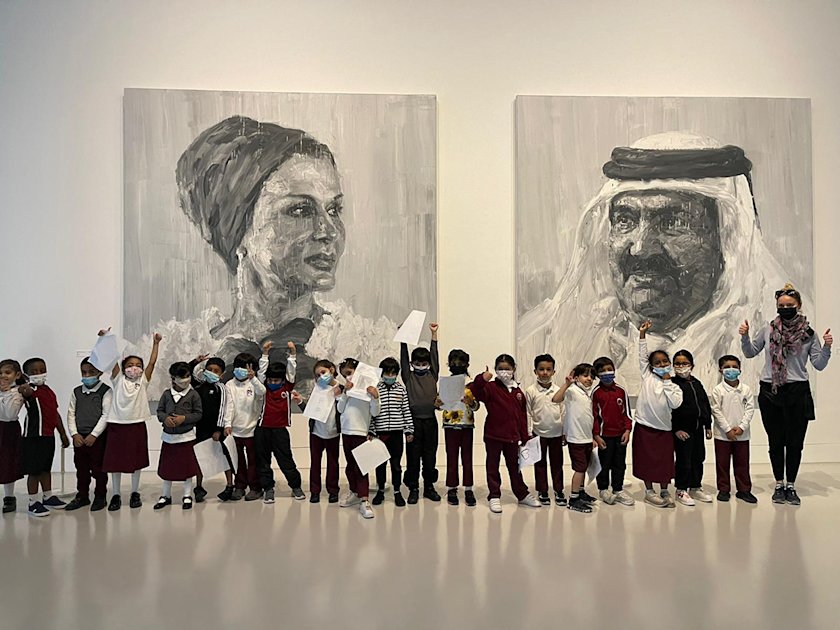
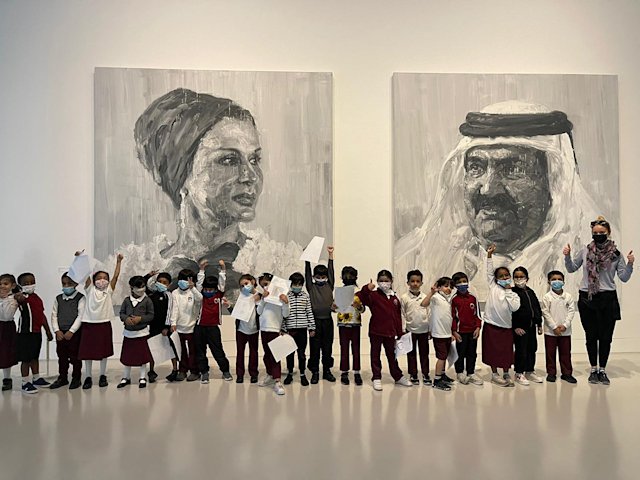
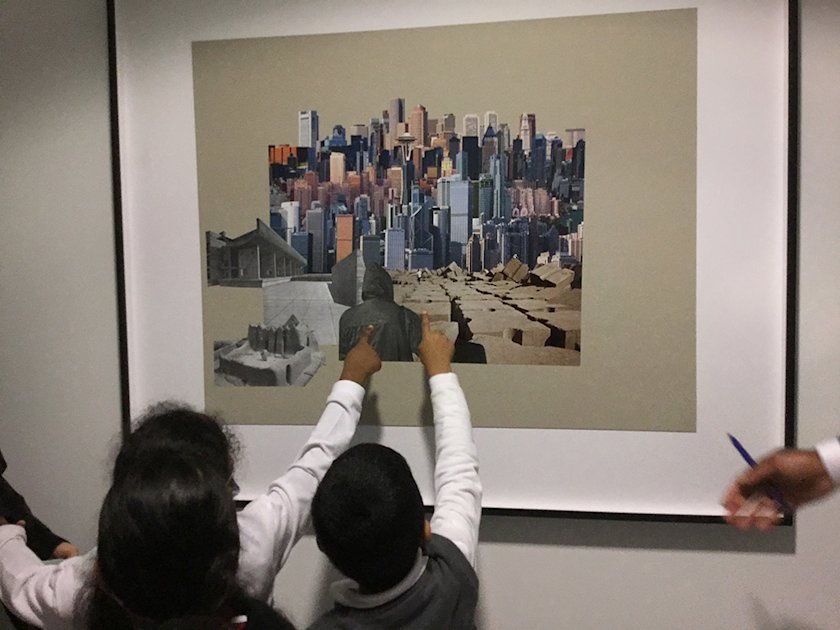
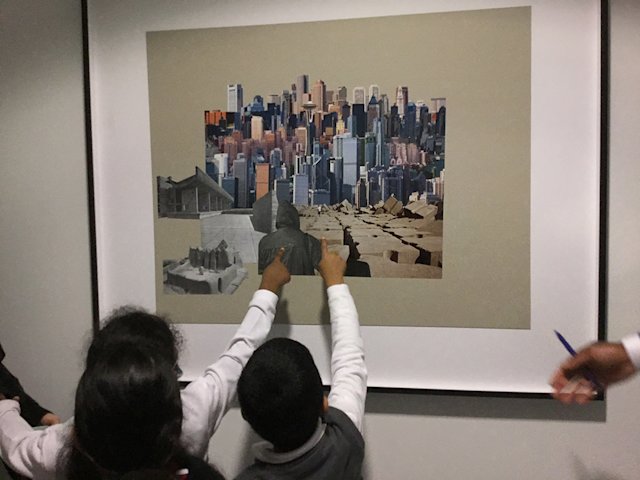
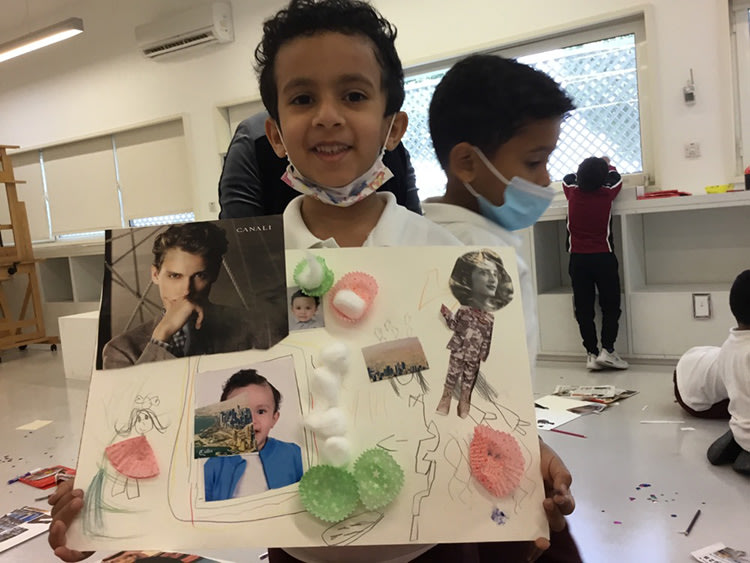
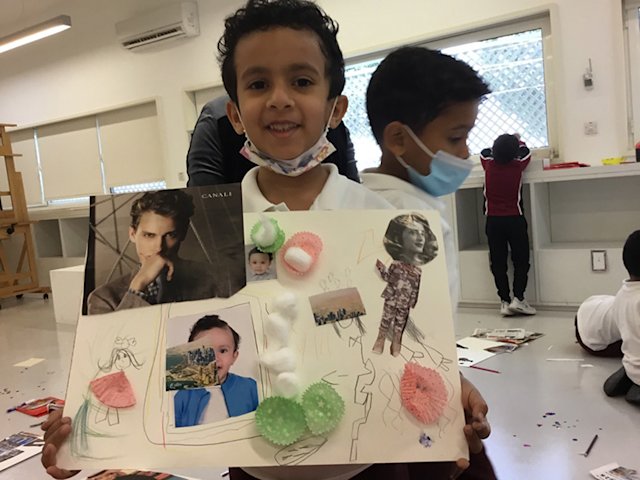
Mathaf: Arab Museum of Modern Art’s collection, co-owned by Qatar Museums and QF, comprises more than 9,000 artworks – the world’s largest specialized collection of its kind.
Finding Their Voice
Through QF production Doha Debates, a group of 17 young people from Qatar were chosen for a program that will see them join aspiring leaders from around the world to equip themselves with the skills to be vital voices on complex global issues.
They were selected to join Doha Debates’ 2022 Ambassador Program, which hones discussion and negotiation skills and enables participants to tackle critical topics – from climate change to gender equality and disability justice – and look to find common ground with peers with diverse worldviews from across the globe.
The 2022 ambassadors, all aged 17-28, include students from Qatar University and QF’s partner universities, as well as a member of the Qatari Armed Forces and young people from the MENA region, the US, Europe, South America, and South East Asia.
Doha Debates’ Ambassador Program is a partnership with Shared Studios, a global startup that uses technology to build connections and enable collaboration anywhere in the world.
Through QF production Doha Debates, a group of 17 young people from Qatar were chosen for a program that will see them join aspiring leaders from around the world to equip themselves with the skills to be vital voices on complex global issues.
They were selected to join Doha Debates’ 2022 Ambassador Program, which hones discussion and negotiation skills and enables participants to tackle critical topics – from climate change to gender equality and disability justice – and look to find common ground with peers with diverse worldviews from across the globe.
The 2022 ambassadors, all aged 17-28, include students from Qatar University and QF’s partner universities, as well as a member of the Qatari Armed Forces and young people from the MENA region, the US, Europe, South America, and South East Asia.
Doha Debates’ Ambassador Program is a partnership with Shared Studios, a global startup that uses technology to build connections and enable collaboration anywhere in the world.
The Ambassador Program takes Doha Debates’ mission to a new level, helping a select group of extraordinary future leaders develop the skills they need to bridge divides and work together to solve urgent problems.
Doha Debates’ 2022 ambassadors come from 16 countries across 5 continents
More than 300 young people worldwide applied to be part of the 2022 program
Exploring Football
Across the years leading up to the FIFA World Cup Qatar 2022™, a research center within QF partner university Georgetown University in Qatar (GU-Q) has delved into what the tournament means for Qatar – and its findings were unveiled as the sporting showpiece drew near.
Publications launched by the university’s Center for International and Regional Studies (CIRS) included Football in the Middle East: State, Society, and the Beautiful Game, which explored the tournament’s influence on migration and labor reform, and media misrepresentation of Qatar’s national football team, described by one author as “a mirror to the society that Qatar is today”.
And Qatar and the 2022 FIFA World Cup: Politics, Controversy, Change provided fresh analysis on the sociopolitical significance of the tournament being held in the Middle East for the first time, as well as Qatar’s leveraging of “sports diplomacy”.
Both books emerged from a multi-year CIRS initiative to produce original research on sport and society in Qatar, examining how the nation is now competing with ‘traditional’ global sporting centers while enhancing its international profile.
Across the years leading up to the FIFA World Cup Qatar 2022™, a research center within QF partner university Georgetown University in Qatar (GU-Q) has delved into what the tournament means for Qatar – and its findings were unveiled as the sporting showpiece drew near.
Publications launched by the university’s Center for International and Regional Studies (CIRS) included Football in the Middle East: State, Society, and the Beautiful Game, which explored the tournament’s influence on migration and labor reform, and media misrepresentation of Qatar’s national football team, described by one author as “a mirror to the society that Qatar is today”.
And Qatar and the 2022 FIFA World Cup: Politics, Controversy, Change provided fresh analysis on the sociopolitical significance of the tournament being held in the Middle East for the first time, as well as Qatar’s leveraging of “sports diplomacy”.
Both books emerged from a multi-year CIRS initiative to produce original research on sport and society in Qatar, examining how the nation is now competing with ‘traditional’ global sporting centers while enhancing its international profile.
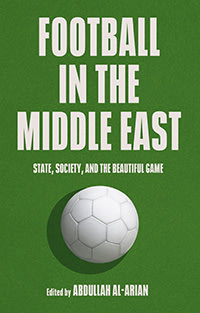

Qatar is a pioneer – the changes that have taken place are unprecedented in the region.
Healthcare Pioneers
Qatar’s efforts to enhance diabetes prevention were boosted in August as two of QF’s research institutes and the country’s Primary Health Care Corporation combined to launch a test of a pioneering prediabetes screening tool.
Known as PRISQ (Prediabetes Risk Score in Qatar), it is one of the first of its kind for screening prediabetes risk in the Middle East, where the prevalence of diabetes is among the highest in the world. The tool, which is now being trialed in primary care settings, was developed by Qatar Biomedical Research Institute and Qatar Computing Research Institute – both part of QF’s Hamad Bin Khalifa University (HBKU) – using demographic data from QF’s Qatar Biobank.
Meanwhile, HBKU’s College of Science and Engineering contributed to an international study that may help to increase the ability of drugs to fight tuberculosis. Researchers from the college worked with counterparts from infectious disease research centers in South Africa, Cameroon, the UK, New Zealand, and Japan to produce the findings.
Qatar’s efforts to enhance diabetes prevention were boosted in August as two of QF’s research institutes and the country’s Primary Health Care Corporation combined to launch a test of a pioneering prediabetes screening tool.
Known as PRISQ (Prediabetes Risk Score in Qatar), it is one of the first of its kind for screening prediabetes risk in the Middle East, where the prevalence of diabetes is among the highest in the world. The tool, which is now being trialed in primary care settings, was developed by Qatar Biomedical Research Institute and Qatar Computing Research Institute – both part of QF’s Hamad Bin Khalifa University (HBKU) – using demographic data from QF’s Qatar Biobank.
Meanwhile, HBKU’s College of Science and Engineering contributed to an international study that may help to increase the ability of drugs to fight tuberculosis. Researchers from the college worked with counterparts from infectious disease research centers in South Africa, Cameroon, the UK, New Zealand, and Japan to produce the findings.


The trial of PRISQ will be a major milestone for the project, with patient-centered outcomes that can help address a pressing health condition in the region.
PRISQ has a unique approach to detecting diabetes, using:
- Age
- Gender
- Body Mass Index
- Waist size
- Blood pressure
An Eye on AI
Within QF’s higher education network, one of its partner universities – Carnegie Mellon University in Qatar – kickstarted a project using Artificial Intelligence technology to coordinate mobile robots in gathering visual data about the quality and health of Qatar’s crops.
The university is also using Artificial Intelligence to automate the cleaning and monitoring of solar panels in Qatar, and automatically score school and university students’ Arabic essays to support their writing skills in the language.
At Weill Cornell Medicine-Qatar (WCM-Q), a new training program allowed college students with an interest in medicine to gain hands-on experience of the university’s laboratories; and health professionals and educators joined an inaugural course in using healthcare simulations as learning tools.
And through Texas A&M University in Qatar’s (TAMUQ) STEAM Summer Camp and Future Engineers Program, high school students learned skills including designing prototypes, 3D printing, critical thinking and problem solving, programming, and the fundamentals of robotics – encouraging them to broaden their minds, and think outside the box.
Within QF’s higher education network, one of its partner universities – Carnegie Mellon University in Qatar – kickstarted a project using Artificial Intelligence technology to coordinate mobile robots in gathering visual data about the quality and health of Qatar’s crops.
The university is also using Artificial Intelligence to automate the cleaning and monitoring of solar panels in Qatar, and automatically score school and university students’ Arabic essays to support their writing skills in the language.
At Weill Cornell Medicine-Qatar (WCM-Q), a new training program allowed college students with an interest in medicine to gain hands-on experience of the university’s laboratories; and health professionals and educators joined an inaugural course in using healthcare simulations as learning tools.
And through Texas A&M University in Qatar’s (TAMUQ) STEAM Summer Camp and Future Engineers Program, high school students learned skills including designing prototypes, 3D printing, critical thinking and problem solving, programming, and the fundamentals of robotics – encouraging them to broaden their minds, and think outside the box.
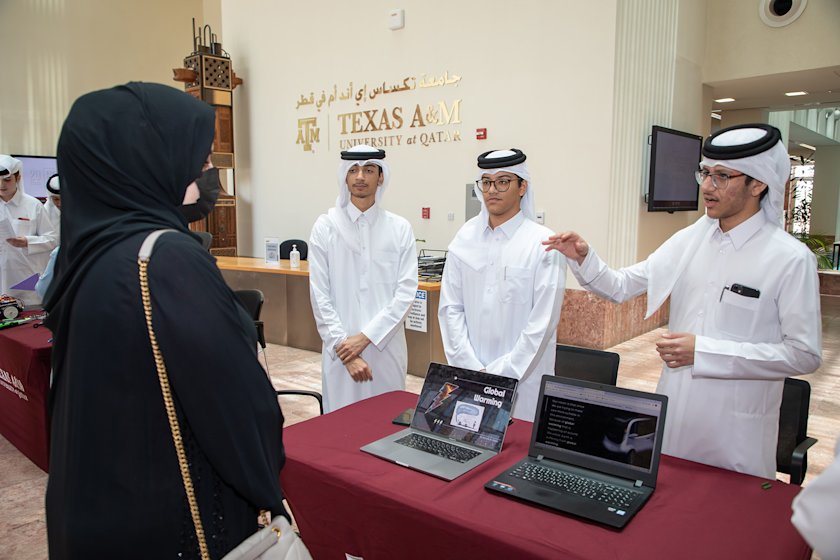
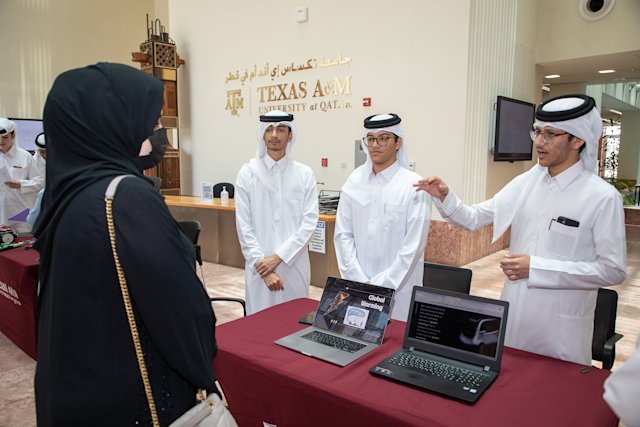
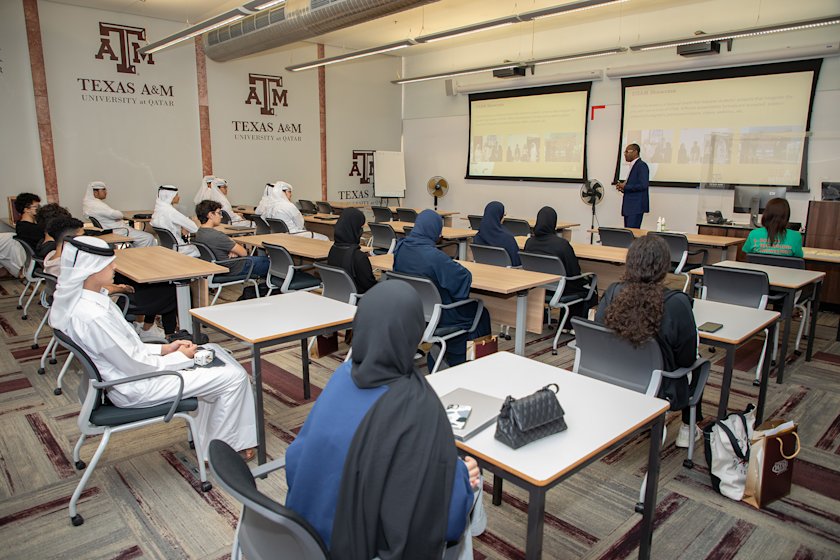
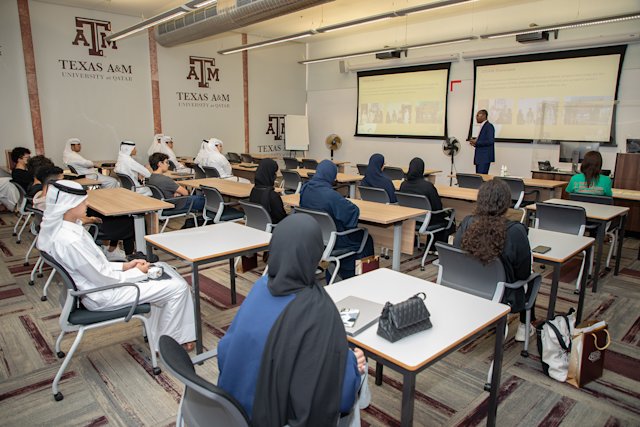
We focused on developing skills that will enable them to become a better version of themselves – beyond academics.
- More than 30 high school students joined TAMUQ’s Future Engineers Program
- 10 college students participated in WCM-Q’s Young Scientist Journey to Research Program
Delving into Debate
Expanding its work in promoting and advancing the art of debate in the Arabic language, QF’s QatarDebate announced the candidates selected for the first batch of its Fellowship Program – an invitation to thinkers from across the world to add to the global knowledge bank in this field.
The program will sponsor and support 12 debate-focused research projects, spanning topics including the development of Artificial Intelligence tools in Arabic debating, indexing and exploring some of the most ancient and valuable Arabic manuscripts related to debate, and conducting social studies on Arabic-speaking debating societies.
Academics, researchers, and students from institutions such as Yale University and Harvard University in the US, Sultan Qaboos University in Oman, and Hassan II University in Morocco were among those selected as Fellows.
And as well as supporting research, QF was also supporting Qatar’s families, as its Qatar Nanny Training Academy welcomed its 10th batch of nannies. In their time at the academy, they will qualify as Arabic-speaking childcare providers who also promote Islamic values.
Expanding its work in promoting and advancing the art of debate in the Arabic language, QF’s QatarDebate announced the candidates selected for the first batch of its Fellowship Program – an invitation to thinkers from across the world to add to the global knowledge bank in this field.
The program will sponsor and support 12 debate-focused research projects, spanning topics including the development of Artificial Intelligence tools in Arabic debating, indexing and exploring some of the most ancient and valuable Arabic manuscripts related to debate, and conducting social studies on Arabic-speaking debating societies.
Academics, researchers, and students from institutions such as Yale University and Harvard University in the US, Sultan Qaboos University in Oman, and Hassan II University in Morocco were among those selected as Fellows.
And as well as supporting research, QF was also supporting Qatar’s families, as its Qatar Nanny Training Academy welcomed its 10th batch of nannies. In their time at the academy, they will qualify as Arabic-speaking childcare providers who also promote Islamic values.
Through this research program, QatarDebate aims to create a global hub where experts and researchers meet and contribute to forming a body of human knowledge.
The first edition of QatarDebate’s Fellowship Program received 177 applications
‘The Gateway to a Better Life’
One year on from arriving in Qatar having been evacuated from their homeland, three members of Afghanistan’s only all-girls robotics team said their farewells to Doha as they began a new stage of their lives at universities in the US – and their happiness at what lies ahead was tinged with sadness.
“Happy because going to university means we are one step closer to our dreams,” said 20-year-old Somaya Faruqi, as she headed to the University of Missouri to study mechanical engineering.
“Sad because it means saying goodbye to Qatar – a country that became our home in what was the most difficult time of our lives. It wouldn’t be an exaggeration to say Qatar has been the gateway to a better life and future for us.”
Within weeks of the three US-bound team members departing Qatar, 10 more of Afghanistan’s brightest minds arrived to study at QF’s Academic Bridge Program – the second batch of the all-female Afghan robotics team, each of them with their own dreams to follow.
One year on from arriving in Qatar having been evacuated from their homeland, three members of Afghanistan’s only all-girls robotics team said their farewells to Doha as they began a new stage of their lives at universities in the US – and their happiness at what lies ahead was tinged with sadness.
“Happy because going to university means we are one step closer to our dreams,” said 20-year-old Somaya Faruqi, as she headed to the University of Missouri to study mechanical engineering.
“Sad because it means saying goodbye to Qatar – a country that became our home in what was the most difficult time of our lives. It wouldn’t be an exaggeration to say Qatar has been the gateway to a better life and future for us.”
Within weeks of the three US-bound team members departing Qatar, 10 more of Afghanistan’s brightest minds arrived to study at QF’s Academic Bridge Program – the second batch of the all-female Afghan robotics team, each of them with their own dreams to follow.
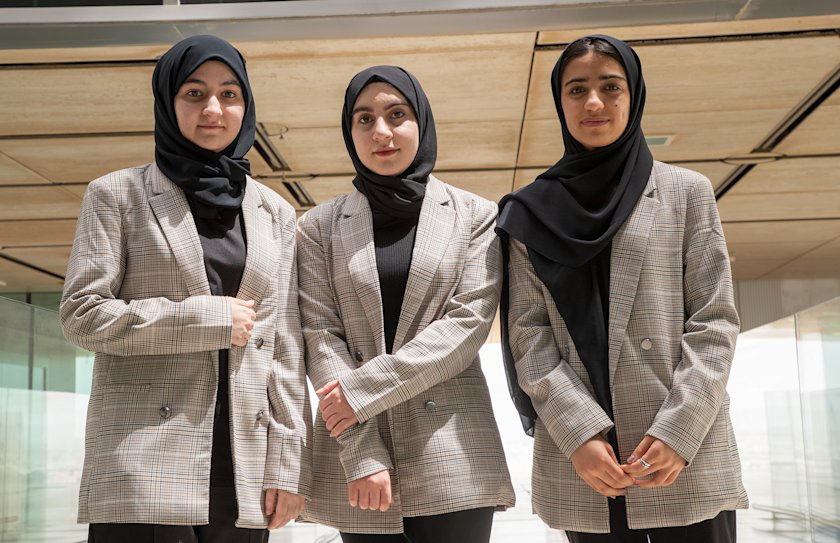
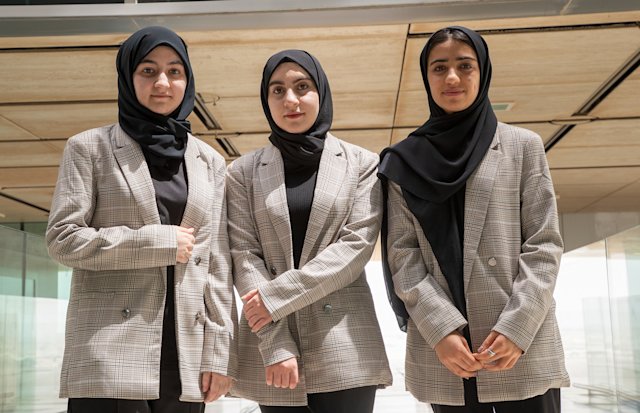
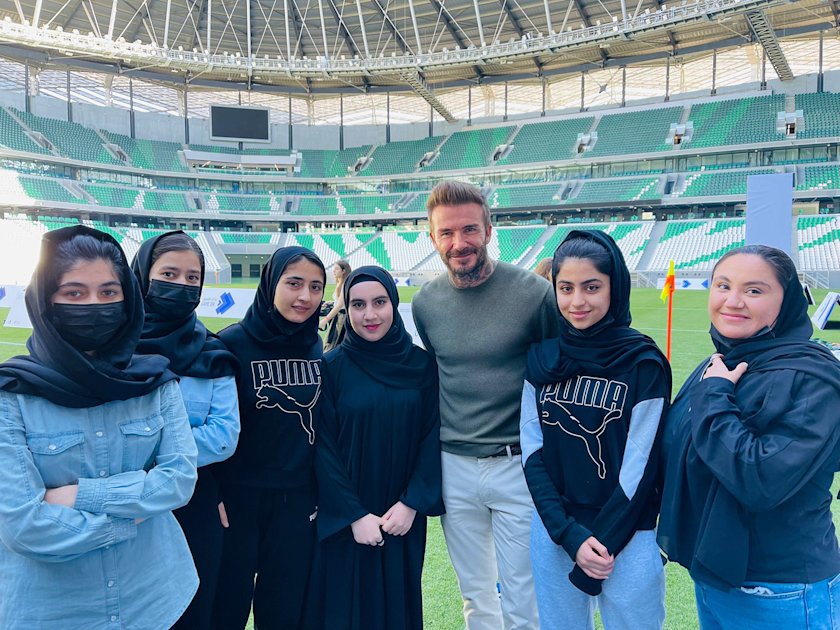
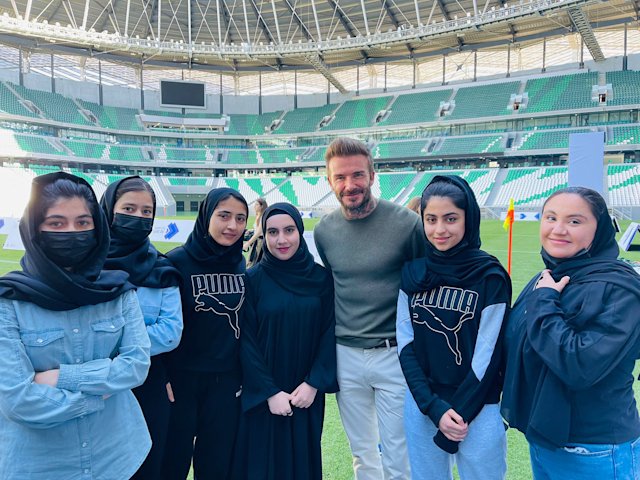
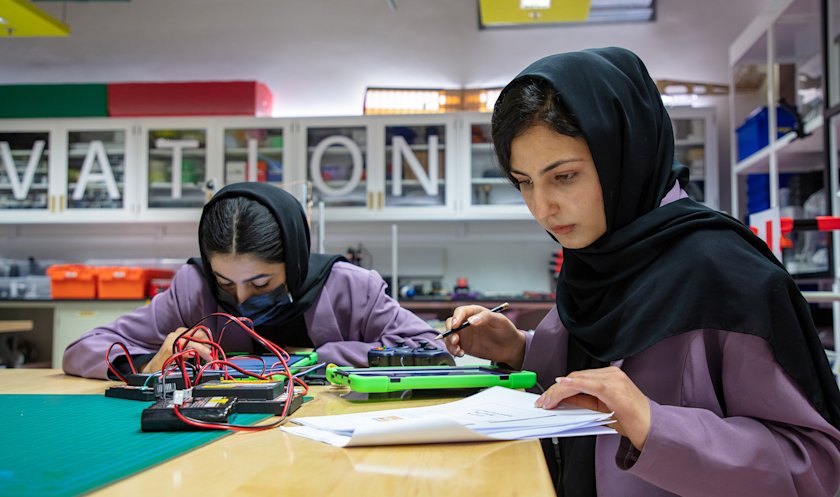
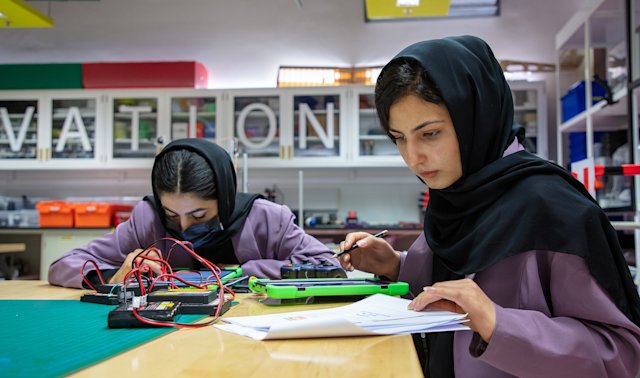
We will forever be grateful that, despite everything, our education was never compromised. In fact, if anything it was accelerated.